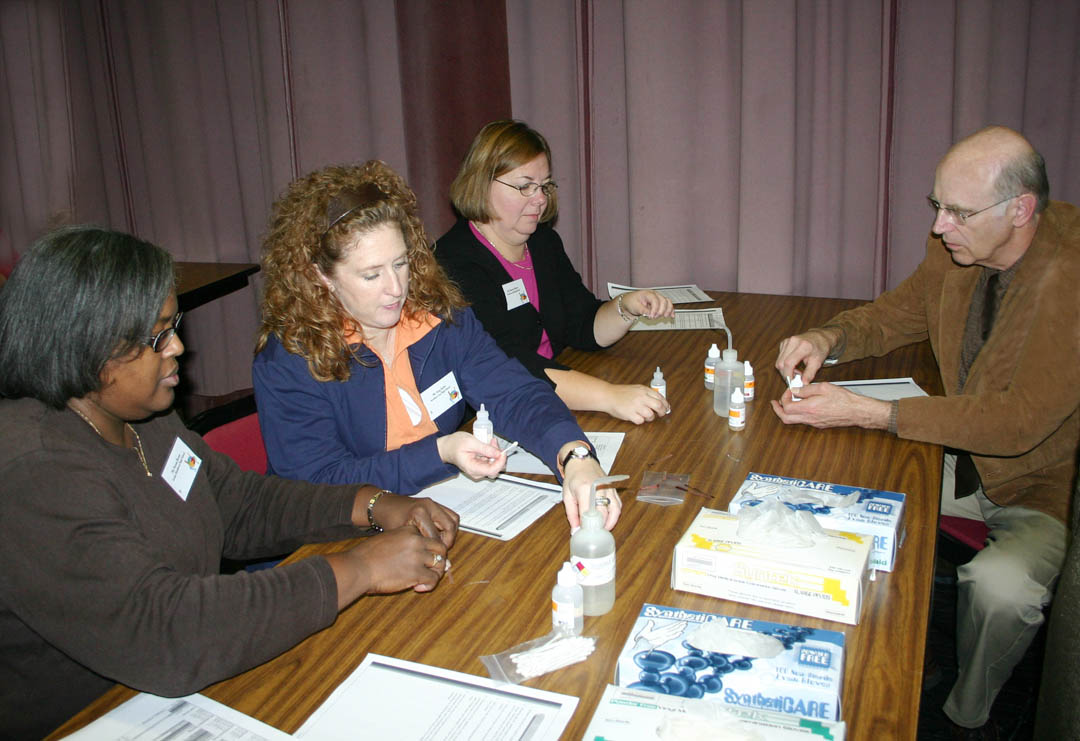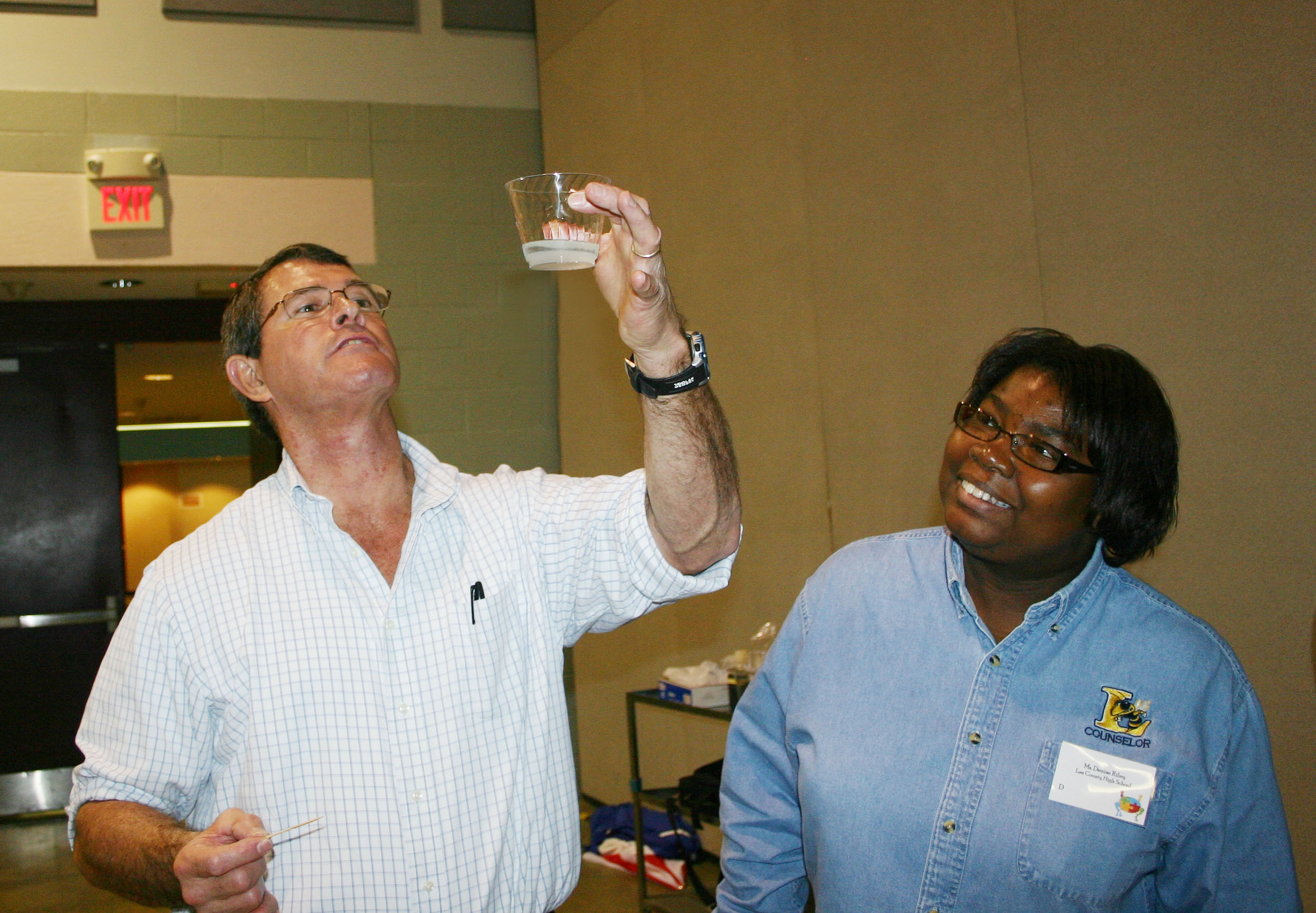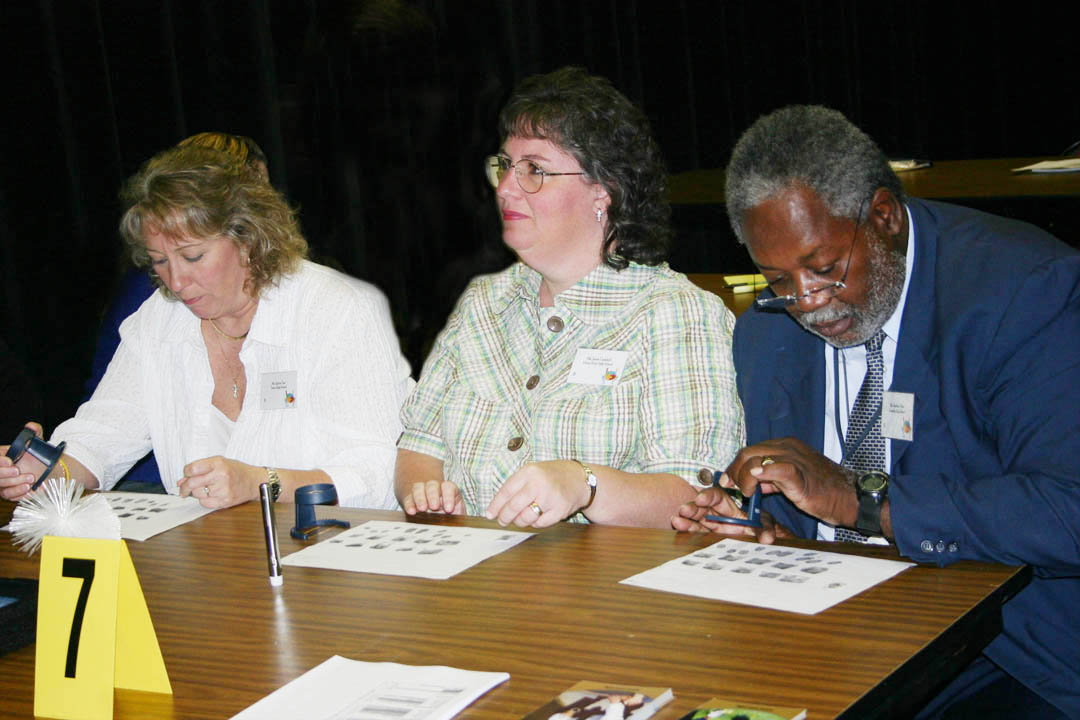
College News
High schools learn of opportunities for students at CCCC
11.18.2008 • College & Community
SANFORD – Sylvia Tart, a Triton High School counselor, leaned over a sheet of paper covered with fingerprints, examining them through a magnifying glass. She carefully compared them with a sample fingerprint she had been given, wanting to be sure she made the right match.
Tart wasn’t working in a police lab – she was learning the basics of how to identify fingerprints in a Latent Evidence workshop at Central Carolina Community College. That workshop was one of several during the college’s Information and Planning Conference for educators from area secondary schools, held Nov. 14 at the Dennis A. Wicker Civic Center.
Tart was one of 54 high school administrators and counselors from six counties who gathered to learn about and have hands-on opportunities with some of the college’s programs. The conference has been held annually for more than 30 years to inform the area high schools of the opportunities the college offers their students and graduates. The 2008 conference showcased the Bioprocessing, Biofuels, Latent Evidence, and Learn and Earn/University Transfer programs.
“I like to keep abreast of the new programs being added at the college,” Tart said. “It’s good to see what’s being showcased. There’s a lot of interest among students about the latent evidence field. I’ll be able to take what I’ve learned about the college’s program back to them.”
Each group of educators rotated through the workshops. In Latent Evidence, they identified fingerprints and learned about analyzing blood at a crime scene. In Bioprocessing, they practiced collecting some of their own DNA. In Biofuels, they learned about this exciting career field that offers viable alternatives to fossil fuels. In Learn and Earn/University Transfer, they heard of opportunities for their students while still in high school or in getting their first two years of a four-year degree at Central Carolina – at considerable cost savings – before transferring to a four-year college or university.
Andy Bryan, Lee County Schools’ assistant superintendent for curriculum and instruction, was impressed by what he saw.
“This conference shows how cutting-edge Central Carolina is,” he said. “What an opportunity for college education our students have in their own community. What administrators and counselors learn at the conference helps them to assist the students in making a direct connection between the classroom and a job area they might be interested in. Maybe one of the areas we learn about will spark that interest in our students for further education.”
The main thrust of holding the Information and Planning Conference is to build a relationship with the high schools, said Bobby Wicker, the college’s director of recruitment.
“We want them to be aware of the post-secondary opportunities we offer,” he said. “They are the key people in area schools who communicate career opportunities to the students.”
Sharon Mercer, the career development coordinator at Northwood High School, said she already has the college’s recruiters come to her school to talk to students about what it offers.
“The conference is wonderful because it enables us to add to our knowledge about the programs at the college to share with our students,” she said.
Representatives attending the conference were from high schools in Chatham, Harnett, Lee, Moore, Orange, and Wake counties: Lee County High, Southern Lee, Triton, West Harnett, Overhills, Harnett Central, Jordan Matthews, Chatham Central, Northwood, Pinecrest, Union Pines, Chapel Hill High, East Chapel Hill, and Holly Springs High.

Educators from high schools in six counties gathered at Central Carolina Community College’s Dennis A. Wicker Civic Center Nov. 14 to learn about opportunities for their students and graduates at the college. The Information and Planning Conference, put on by the college annually for more than 30 years, provides information and hands-on experience with selected programs. The 2008 event covered Bioprocessing, Biofuels, Latent Evidence, and Learn and Earn/University Transfer. In the Latent Evidence workshop, the educators learned how students are trained to work with blood evidence from a crime scene. Doing experiments with dried blood samples are (from left) Norma Boone, principal of Jordan Matthews High School; Amy Salter, assistant principal of Southern Lee High School; Sharon Mercer, career development coordinator at Northwood High School; and Thomas Harvley-Felder, principal of East Lee Middle School.

Educators from high schools in six counties gathered at Central Carolina Community College’s Dennis A. Wicker Civic Center Nov. 14 to learn about opportunities for their students and graduates at the college. The Information and Planning Conference, put on by the college annually for more than 30 years, provides information and hands-on experience with selected programs. The 2008 event covered Bioprocessing, Biofuels, Latent Evidence, and Learn and Earn/University Transfer. In the Bioprocessing workshop, Denise Riley (right), a counselor at Lee County High School, is impressed as Robert Powell, chairman of the college’s Public Services Department, shows a simple method for collecting a sample of her DNA. The method consists of rinsing the mouth with salt water and adding liquid soap and isopropyl alcohol to the solution to cause tiny strings of DNA to rise to the surface.

Educators from high schools in six counties gathered at Central Carolina Community College’s Dennis A. Wicker Civic Center Nov. 14 to learn about opportunities for their students and graduates at the college. The Information and Planning Conference, put on by the college annually for more than 30 years, provides information and hands-on experience with selected programs. The 2008 event covered Bioprocessing, Biofuels, Latent Evidence, and Learn and Earn/University Transfer. In the Latent Evidence workshop, educators learned how the college’s program trains students to study evidence found at crime scenes, including fingerprints. Analyzing fingerprints on a page are (from left) Sylvia Tart, a counselor at Triton High School; Janet Caddell, college advisor/scholarship coordinator at Union Pines High School; and Stanley Price, assistant principal at Overhills High School.
- Central Carolina Community College
- Serving Chatham, Harnett, & Lee Counties, NC
- 1-800-682-8353



